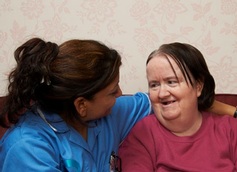Overhaul of home care services needed, says United Kingdom Home Care Association
An overhaul of the service that commissions home care for those in need is required, the United Kingdom Home Care Association (UKHCA) has said, following the publication of the Burstow Commission’s ‘Key to Care’ report on the future of home care workers.

The UKHCA has praised the commission for creating a report that takes into account a range of different views and experiences within the home care industry.
The report, published by The Local Government Information Unit (LGiU), highlighted the risk that quality home care providers may be forced out of the home care industry due to local councils demanding low prices in the purchase of more than 70 per cent of all home care services.
‘Increasingly complex care’
Speaking about the Commission’s report, policy director for UKHCA, Colin Angel, said: “Older and disabled people deserve excellent services from a workforce which is suitably trained, committed and adequately rewarded for the increasingly complex care required to be delivered at home.
More than 500,000 people receive funded care within their own homes in England, whilst the National Audit office reported in March that 12 per cent of people fund their own care.
The report indicates that approximately 60 per cent of home care workers are on zero hours contracts with no guarantee of work on a daily or weekly basis. The Burstow Commission argues that home care workers should have the opportunity to choose whether they have a zero hour contract of employment.
Mr Angel said: “Home care workers are our greatest asset and their services already support demands on a struggling health service. However, inappropriate commissioning by local councils is self-defeating and carries risks of rushed, undignified services which lack continuity by focussing on limited time for care and a constant pressure to reduce providers’ fees.”
In addition, the report recognised the UKHCA’s recommendations on local councils paying the national minimum wage or the living wage to care workers.
Calculations made by the UKHCA have been made, taking into account the minimum cost of home care and the living wage, further accounting for the cost of the care worker, the cost of travel and the financial outlay required to run the business.
Taking these factors into account, the UKHCA has deemed that local councils must take the cost of providing care into account when commissioning home care services. Local authorities should ensure that each home care service provider is able to pay at least the National Minimum Wage or the Living Wage to each home care worker.
The UKHCA has estimated the minimum price that local authorities should pay for home care services, in order to provide sustainable care and to comply with National Minimum Wage and Living Wages. The guidelines indicate that councils should pay, £15.74 per hour for the National Minimum Wage, £18.59 per hour for the UK living wage outside of London and £21.33 per hour for the living wage within London.
'Move away from time and task commissioning’
Mr Angel added: “It is essential that local councils reflect on the Burstow Commission’s findings to move away from ‘time and task’ commissioning and refocus on purchasing effective outcomes for individuals and also value the home care workforce appropriately.”
The report recognises that where local authorities that cannot meet the UKHCA’s minimum price of care, they must be able to substantiate their decision and receive approval from their local Health and Well-being Board.
Janet Morrison, chief executive of Independent Age, said: “We welcome the recommendations in today’s report, particularly those that focus on better pay for care workers.

Furthermore, the Commission’s report recognised the need for clear home care pricing from councils and providers and supports advice issued as part of the Care Act 2014.
Ms Morrison continued: “Currently up to 220,000 care workers are paid less than the national minimum wage. But these staff do challenging and specialised work in supporting old and disabled people. Putting this right, however, requires fundamental reform, as the root cause of low pay and zero-hours contracts of care workers, is a care system impacted by years of underfunding.”
The association criticized the practice of councils encouraging home care providers to bid for the right to supply care services to people with disabilities and older people, however, welcomed the ‘license to practice’ in support of the Care Certificate.
’Broken care system’
Trevor Brocklebank, the chief executive of Home Instead Senior Care, said: “I welcome the publication of today’s important report. But it is only the first step in a long process to begin to change the UK’s broken care system. Its findings are not pretty. It talks of carers dashing to deliver ‘care’ in 10-minute slots, of old people seeing 50 different carers in a year.

“As the chief executive of the UK’s number 1 provider of high-quality home care, I am proud to say this is not us. Nor is it many other quality providers within the UK Home Care Association (UKHCA). We refuse to take on contracts that specify 15-minute slots of care – for us, proper care can’t typically be delivered in less than an hour and that is the minimum we provide. Mr Brocklebank continued: “Many of our CAREGivers have come to us from other companies where they have felt stressed, undervalued and unable to deliver the high quality care they want to. They describe joining Home Instead Senior Care as a ‘relief’.
“We respect and value our frontline CAREGivers, who enjoy above average terms and conditions and specialist training – for example, in looking after people with Alzheimer’s. Most of all, we give them the time to care and to build lasting relationships with their clients. “I will be working closely with the UK Homecare Association, with government and with our own CAREGivers to consider the implications of the report and to lobby for change.
The UKHCA, hopes that the planned overhaul of the system will aid the delivery of better care for people who require home care services and a reduction in staff turnover.
Mike Padgham, chair of The Independent Care Group, said: “Here we have the evidence that at present home care is failing both those who need it and those who provide it. Because there is no money in the system, we cannot create a proper, professional workforce that is properly rewarded and motivated to provide an excellent service. Instead we have teams of committed, compassionate and well-meaning individuals doing their best for their clients in a system that is close to breaking point.”
'Lacks commitment and investment from Government'
Mr Padgham recognised the need for change and ‘a professional, well-paid, well-trained and properly regulated workforce.’ He said: “Social care commissioners, like local authorities, and the Government, have to recognise that more needs to be invested into social care so that providers are paid a fair price for the care they provide.”
Mr Padgham added: “Only then can we see an end to the situation where you have care workers, some paid the minimum wage, some not paid for travel time, dashing from client to client and in some cases limited to a cursory 15-minutes visit to provide someone with care that is supposed to offer dignity and independence.
“The independent sector, which provides the vast majority of care provision, has the skills, abilities and flexibility to do the job, it just lacks the commitment and investment from government to make it happen.”
There are currently plans by the Health and Care Professions Councils (HCPC) and the Government for a register of ‘negative’ or ‘voluntary’ care workers. A scheme which the UKHCA have recognised as providing the opportunity to raise the profile of the home care services and care workers as well as encouraging training and investment opportunities within the sector.
The UKHCA is a professional association that aims to promote and encourage sustainable care services that enable people who require care to live at home and interact within their local communities.
Latest News Analysis
 04-Sep-19
Extra £1.5 billion announced for social care in Chancellor's Spending Review
04-Sep-19
Extra £1.5 billion announced for social care in Chancellor's Spending Review
 17-Jul-19
Flexible Working Bill for all jobs gets MPs approval - delighting parents, disabled and carers
17-Jul-19
Flexible Working Bill for all jobs gets MPs approval - delighting parents, disabled and carers
 18-Jun-19
Overnight care workers forced to sleep in offices and told 'bring your own bedding'
18-Jun-19
Overnight care workers forced to sleep in offices and told 'bring your own bedding'
 11-Jun-19
PM candidates on social care: Rory Stewart calls fixing care an 'unfinished revolution'
11-Jun-19
PM candidates on social care: Rory Stewart calls fixing care an 'unfinished revolution'
 05-Mar-19
Amber Rudd announces scrapping of controversial PIP payment review for pensioners
05-Mar-19
Amber Rudd announces scrapping of controversial PIP payment review for pensioners